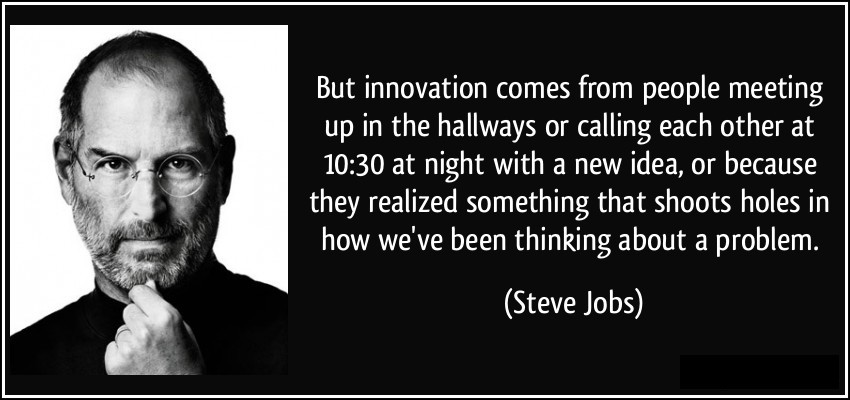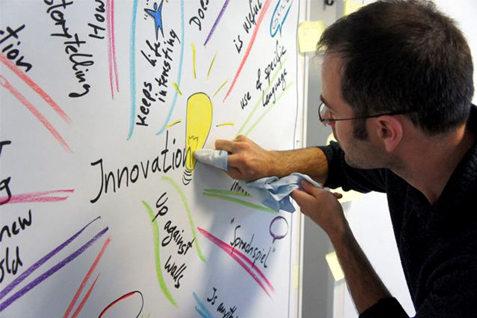Innovation ecosystems involve many hopeful and inspired people along the journey of bringing an idea to life. There are serial entrepreneurs, incubators, startups, seed investments, venture capital, accelerators, labs, governments, and support services galore to help companies with the latest whiz-bang idea.
Like bait on a hook, magazines like Entrepreneur and Fast Company bombard aspiring business people with the happy and ambitious phrases defining what you should do or be to create the next best disruptive invention:
- Your brilliant ideas impact the world!
- Surround yourself with a community of greatness, inspiration and like-minded rebels!
- Ignore the naysayers! Ignore the haters!
- Take bold action! Be a risk taker Push your boundaries!
Well here is a little secret. All of these inspirational slogans are annoying as hell to those on the front lines of innovation in big-company cultures.

Making innovation happen isn’t a happy experience. It is a grinding, protracted battle. What most companies would call a victory, like a big sale inked, or an introduction of a new product on the shelves, well, that is not when innovators celebrate. Our small victories, when they come, are celebrated on the down low, inside the hidden innovation network.
We celebrate when minds are converted, which happens at a snail’s pace. It only happens one mind at a time. That is when we kick back, smoke a proverbial cigar with our small squad of disruptors, and wait for the next battle to begin.
You will never fully experience the bright side of innovation without understanding that it comes with a powerfully dark side, and at great cost to those who fought the fight. Often it falls to those who have lived on the entrepreneurial side but are now, as my colleague says “in the belly of the beast”.
Innovation is a Dirty Word
Innovation: That undefined, grossly overused, sometimes magical (meaning “brilliant”) word. That “generates excitement” word. That “We must have it because everyone else does” word. That word that is used by people who really don’t know what it means, or what it takes, but are convinced that that they need it.
Merriam-Webster defines innovation as a new idea, device, or method, but it has taken on multiple meanings in the business ecosystem. The word could mean invention, or investing in startups. It could mean new product development, or testing assumptions about what buyers want, or a substitute for “creative.” Too often, in corporate life, it is also a curse.

Lots of people want to innovate, whether they are entrepreneurs or trailblazers within an organization. Some of us actually break out of corporate life and do just that. We start our own businesses, we thrive, we fail, we exit, we get great PR, we hobble, and sometimes some of us end up back in the corporate machine. But in our minds, we still are visionary thinkers driven to change the world. Not in some distant future. But now. We are just as impatient as when we were entrepreneurs.
What we encounter is a lot of people who want to “WOW” their colleagues and gush about innovation and their role in it, but the fact is, no one really wants to get in there to see how it’s done. They only want to see the successes, without taking the risks or looking at all of the failures. Ninety percent of the time innovation leads to failure or learnings of what worked and what didn’t. These outcomes make corporate executives very uncomfortable.
There is never only light in innovation. If we want true collaboration to fuel innovation ecosystems, one must explore where and how disruption occurs.

The corporate machine likes conformity, trade secrets, efficiency, and matching results to forecasts. On the other hand, the innovation machine is fueled by non-conformity, breaking the rules, transparency and collaboration, and recognizing that unexpected results are sometimes the most valuable outcomes. No surprises here folks. Two conflicting cultures are at odds from the get-go.
Innovation ecosystems are more than startups, funding, accelerators, and whatnot. Corporate entities are often the purchasers of innovative products or services, and are also the eventual exit strategy for the entrepreneurs in the ecosystem. And corporations are where the dark side of innovation exists.
Author : Natalie Sweeney
Further readings
[…] Making innovation happen isn’t a happy experience. It is a grinding, protracted battle. What most companies would call a victory, like a big sale inked, or an introduction of a new product on the shelves, well, that is not when innovators celebrate. Our small victories, when they come, are celebrated on the down low, inside the hidden innovation …read more […]
I would love to share this on Facebook. Would that be appropriate?
Hello Julie,
Thank you for your comment ! Yes, please feel free to share this on Facebook.
Regards
[…] See part 1 here […]
[…] part 1 here and part 2 […]